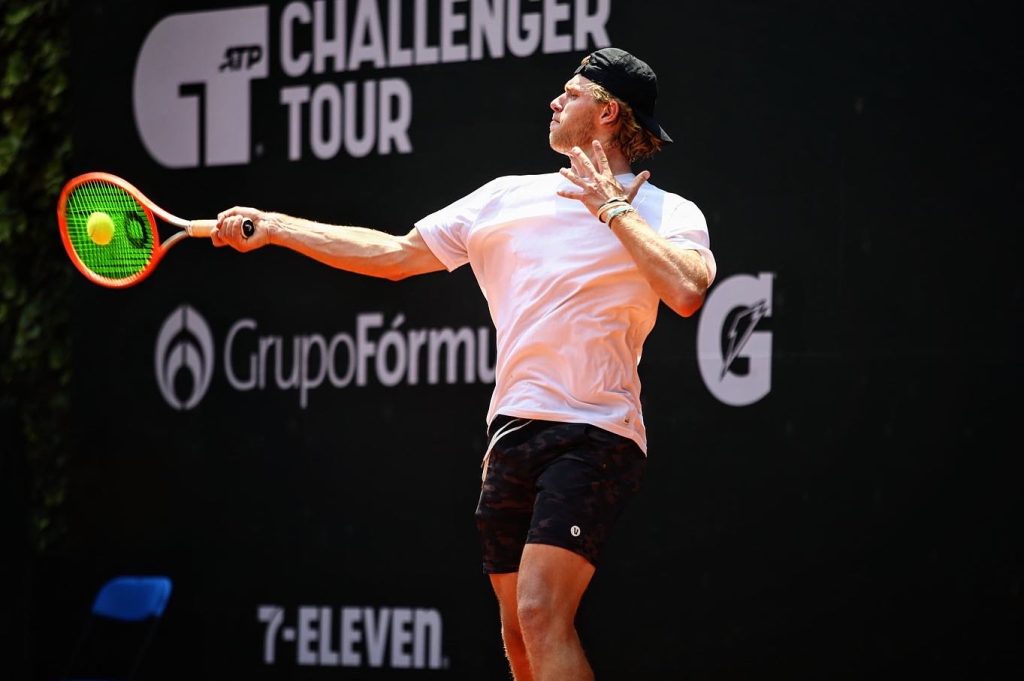If you search the Association of Tennis Professional (ATP) rankings for the top professional doubles’ players in the world, the first set of players listed are within the top 100. To find players with rankings beyond 100, you must select from a drop-down menu in groups: 101-200, 201-300, 301-400, and so on, until you get to the last set of more than 1000 players, listed simply as 1500+.
If you had looked up Coronado High School graduate Ryan Seggerman’s doubles ranking about a year ago, you would have had to select that last set to find his name, ranked at 2106 in the world. If you check the list today, Seggerman’s ranking has skyrocketed to the very first list, tied with his doubles partner Patrik Trhac, at 93 in the world and 10th highest in the United States. The remarkable increase is the largest worldwide in men’s doubles in that time frame.
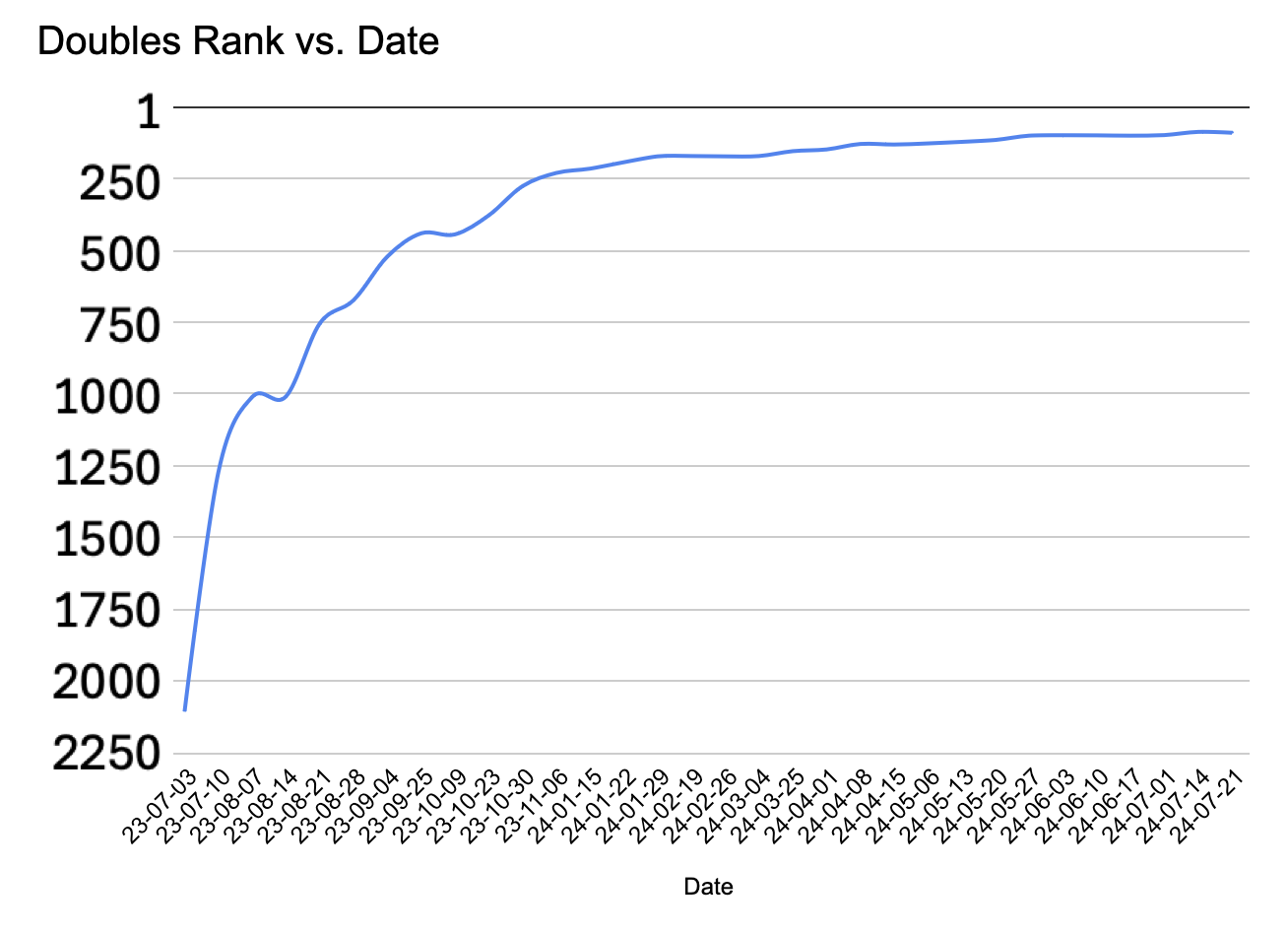
The team has already surpassed its goal to be ranked in the top 150 within their first year. Their next goal is to play in one or more of the grand slam tournaments: Australian Open, French Open, Wimbledon, and the U.S. Open. Their next opportunity is the U.S. Open in New York beginning August 26. The duo has a good chance of earning a bid but there are no guarantees.
The Grand Slam tournaments admit a field of 64 doubles teams, or 128 players. Although Seggerman and Trhac are ranked within the top 128, tournament officials allow the top singles players to use their singles rankings to qualify to play doubles. So, for example, Italian Jannik Sinner is ranked number one in singles but 341 in doubles. If Sinner wants to play doubles, he can use his singles ranking to help him get a bid over Seggerman and Trhac. Before Seggerman and Trhac know whether they will receive a bid, the officials must first determine the number of top-ranked singles players who plan to play doubles. So, the pair waits, and in the meantime, they are trying to win as many matches as they can to increase their ranking and chance of a bid.
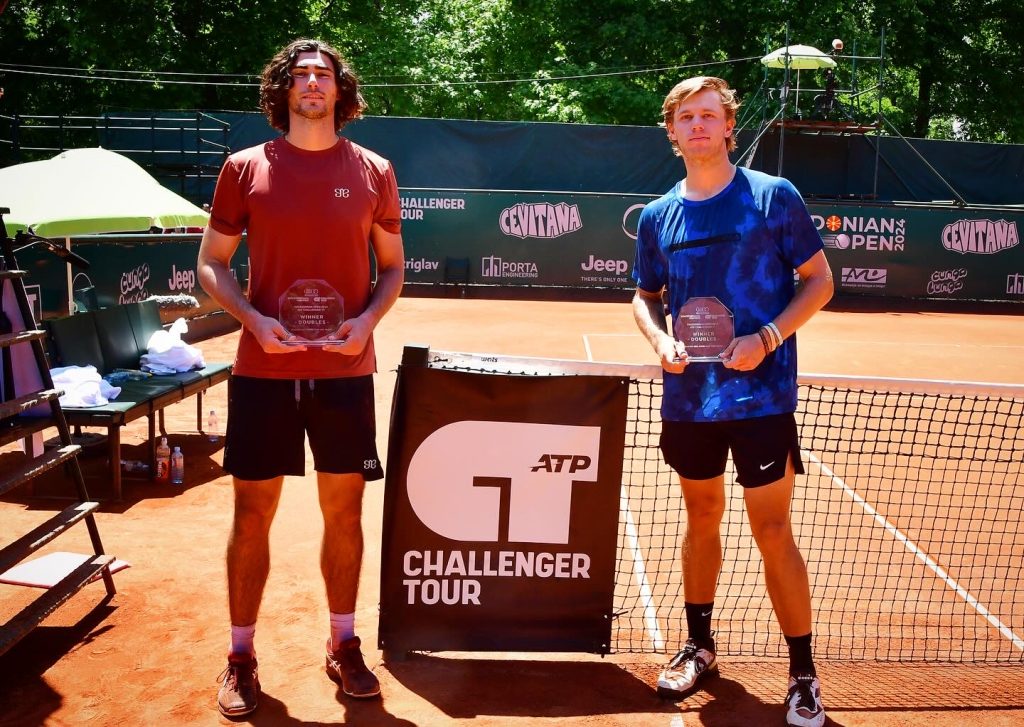
A look back at the past year provides a window into the drive and tenacity it took to get into this position. First, the pair had to make the difficult decision to go pro in the first place. Only the very best in the world are well paid, and to get paid a team must win again and again and again at the highest-level ATP tournaments. Next, to get into the highest-level tournaments a team must grind through Futures and Challenger tournaments where the payouts are (mostly) low. To add to the challenge, players must progress through two levels within Futures and five levels within Challengers to qualify for ATP 250, 500, and 1000-level tournaments. Then there are the most coveted 2,000-point Grand Slam Tournaments.
Once they decided to pair up, Seggerman and Trhac were all in. They spent the past year playing in Futures and Challenger tournaments all over the world, sometimes in back-to-back-to-back-to-back-to-back-to-back-to-back weeks. In contrast to the entourage of agents, schedulers, coaches, sports psychologists, physios, and family members that the biggest names in tennis have, Seggerman and Trhac travel alone. They pay for their own flights, and they only get support for hotel rooms at Challenger and ATP Tournaments. They have one sponsor, Solinco, that provides strings but not the cost of stringing, and another sponsor, Albion Fit, that provides tennis clothing.
“There’s no salary, no guarantees of anything,” Seggerman said. “You have to go out and earn it every week. You only get paid on as well as you do, so it is a bit of a gamble. I think I’m a competitive person by nature. I’m keen on seeing how far I can go … Every week is a new opportunity to earn money to beat the guy on the other side of the net.”
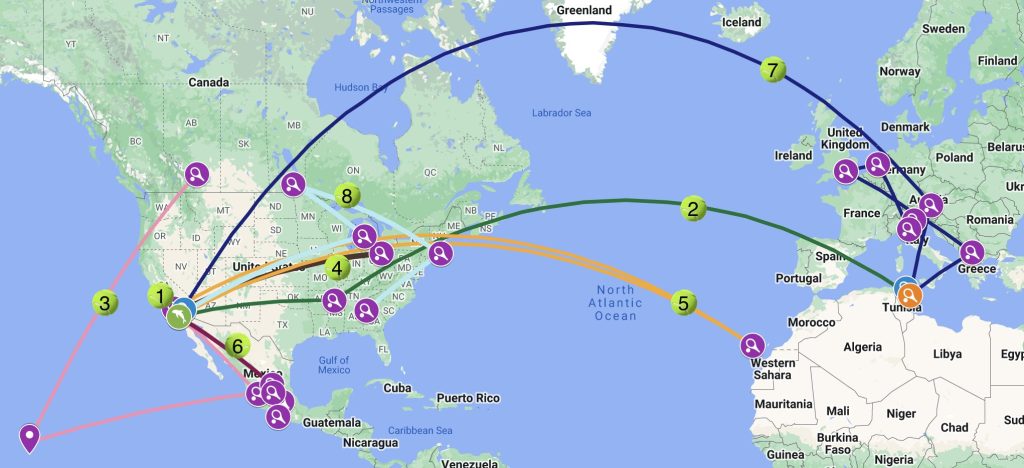
Over the past year, the pair has an impressive 72-18 record. They won all eight of the Futures Tournaments they entered, and were champions or finalists in almost half (45%) of the Challenger Tournaments. The team earned a wildcard for the Indian Wells ATP-1000 tournament in January, and won their first round in thrilling fashion. They gained entry into three ATP-250 tournaments, and are points away from winning on that stage.
They also have a cerebral, almost philosophical, approach to their effort. The life of an aspiring professional tennis player simultaneously requires unyielding confidence and extraordinary humility. “You have to get comfortable with losing matches,” said Seggerman. “Every week there is only one singles [player] who wins and one doubles team that wins so you have to get used to being a loser.” He continued, “That sort of challenge every week is enticing. There’s no time to dwell on losses, and there’s not a lot of time to really celebrate wins. You have to stay in that competitive mindset.”
Managing life on the road can be a challenge. Coronadan Randy Nixon, a two-time NCAA All-American tennis player who was once ranked 175 in the world, knows this better than just about anyone because he lived it. Similar to the current forays of Seggerman and Trhac, Nixon bounced back and forth between Challenger and ATP tournaments over a period of four and a half years. In 1986, he earned a singles bid into the Australian Open, losing to Matt Anger in four sets. (As an aside, for his effort, Nixon earned $0. If he were playing today, he would have earned $120,000 for getting into the draw due to a recent ATP commitment to support the great players outside the top 25). He also earned bids to play doubles in the 1986 US Open and the 1984 Australian Open, losing in three sets in the first round both times.
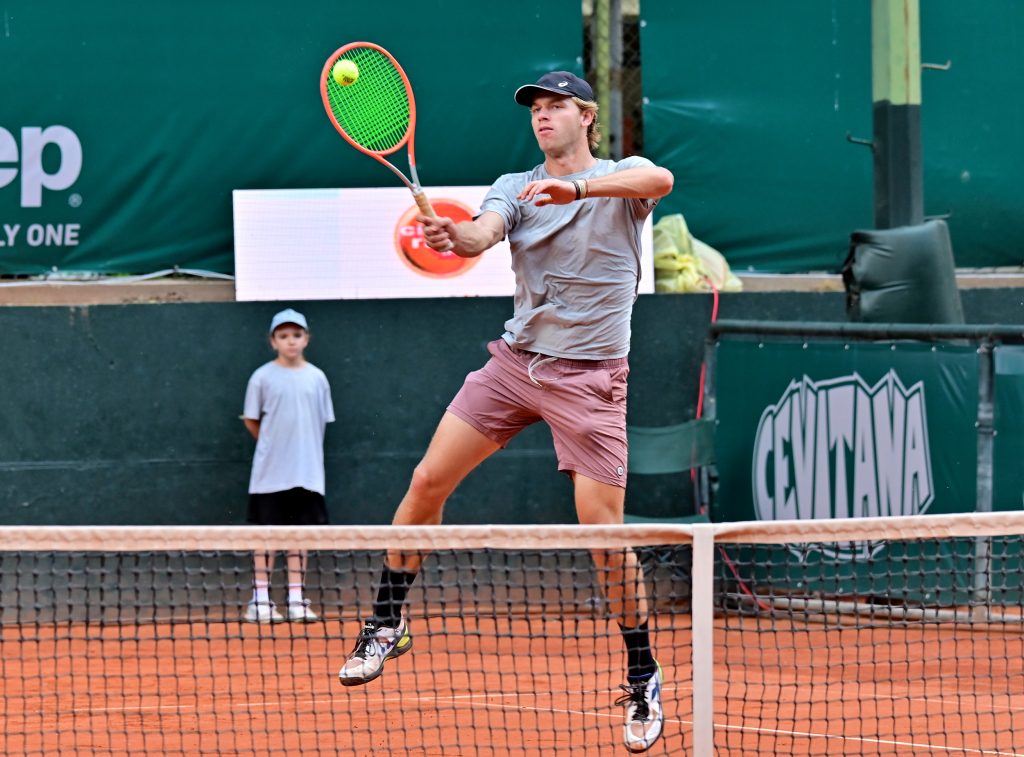
“All hats off to them for for grinding and getting where they’re at now,” said Nixon. “They’ve gone to all corners of the earth to play tournaments. They’re putting themselves on the line and … they’re having success more often than not.” Nixon continued, “He and his partner … first started out and they went to Tunisia. So that (kind of tournament) is where you have to get started to build your ranking, and you don’t make much money. It’s full credit for them to have the ranking they do right now. That’s really impressive.”
Seggerman plays singles when his schedule allows. Similar to doubles, his singles ranking has also soared, from 1239 on July 3, 2023 to 407 as of July 27, 2024. Since May, he has made it to the semi-finals of two Challenger Tournaments, and has a notable 32-20 record in the past year.
Seggerman was diagnosed with type one diabetes the day before he started his senior year of high school. He manages the chronic disease with injections of insulin and constant monitoring of his blood sugar. The rollercoaster of blood-sugar swings can be daunting when traveling and exercising, as Seggerman experienced at a recent tournament in Winnipeg. After a hard day of travel followed by a rain delay that suspended a match, he was up all night because his blood sugar stayed persistently low. No amount of glucose would increase his blood sugar to a normal range.
Once again, Seggerman’s philosophical outlook came into play. “You have to play the hand you’re dealt every day,” said Seggerman. “Maybe I can point to that one [experience that] interrupted my sleep a bit more, and I didn’t feel as good the next day. But there’s a lot of days where I could have slept bad for a million reasons. There’s a lot of days where … my blood sugar was fine, and I didn’t sleep well.” As a professional athlete with type 1, Seggerman is not alone. Other athletes include #4-ranked tennis player Alexander Zverev, former NBA stars Chris Dudley and Adam Morrison, MLB pitcher and one-time Padre Brandon Morrow, longtime NFL quarterback Jay Cutler, and five-time swimming Olympic gold medalist Gary Hall Junior.
Looking forward, Seggerman and Trhac have extraordinary upsides and their journey has just begun.
First, they use their height to their advantage. Trhac is 6’6″ and Seggerman 6’4″. Their height contributes to their monster serving and skilled net play. “They’re beasts up there at net, and they serve huge,” said Nixon, assessing the team’s play.
Second, they play as a team. Although the top 30 or so doubles players in the world tend to play with the same partner, most doubles players do not. Seggerman and Trhac have played together since July 2023. Playing together allows players to know what to expect from each other, they can strategize together, coach each other, and take advantage of each others’ strengths. “They seem to really get along well together and keep each other up which is very important in doubles.” said Nixon.
They also have age on their side. The top 100 doubles players range in age from 21 to 44 years old. At 24 and 25 years old, the two are among the youngest ten players in the top 100. In other words, they have time to continue to grow, take advantage of each other’s strengths, and win as a team.
Third, they play the big points well. In ATP (but not Grand Slam) tournaments, the doubles teams play the best two of three sets, with no-ad game scoring, and a 10-point super tiebreaker for the third set rather than a traditional first-to-six-games set. Being able to play the points after deuce and the tiebreakers well is critical, and the team’s record for these junctures is impressive. They are 17-8 in super tiebreakers, winning two-thirds of them. “You look at their record,” said Nixon. “Obviously they’re doing something right to win a lot of super tie breakers.”
As Seggerman and Trhac continue to capitalize on their strengths and build on their outstanding record, their future looks exceptionally promising. We’ll have an update in mid-August to share whether they will be playing in the U.S. Open. In the meantime, follow them on Instagram @ryanseggerman and @patrik.trhac.
